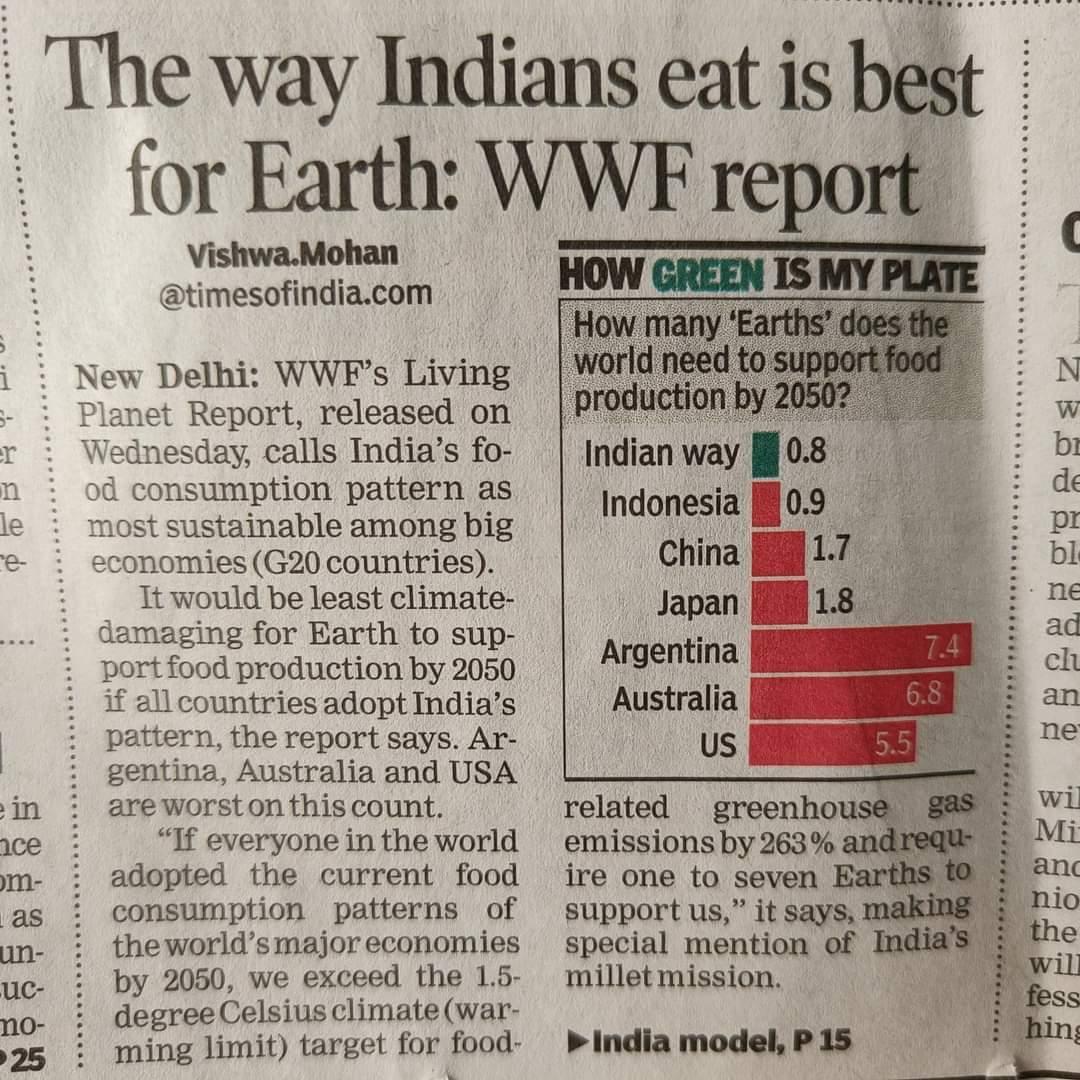The Ancient Wisdom of Bharat: How India's Sustainable Eating Patterns Inspire Global Change

The Ancient Wisdom of Bharat: How India's Sustainable Eating Patterns Inspire Global Change
With the passage of time, scientists often find themselves revising their earlier understandings, either debunking or solidifying them based on further discoveries. Yet, as modern science stumbles upon new findings, there is a civilization that documented such knowledge thousands of years ago—a civilization that remains alive and flourishing even as many others have perished. That civilization is Bharat, the land of Sanatan, and it holds the keys to sustainability, prosperity, and survival.
A recent WWF report hails India's food consumption patterns as the most sustainable among major economies, stating that the way Indians eat could save the planet. As the world grapples with the climate crisis and depleting resources, this report reveals that adopting India's food culture could be the answer to the Earth's future.
The World Wildlife Fund's (WWF) Living Planet Report is a wake-up call for the global community. India's diet is shown to require the least number of Earths to sustain food production by 2050, in stark contrast to other countries such as Argentina, Australia, and the USA, whose consumption patterns would devastate the planet. The report indicates that if everyone followed India's example, we would use only 0.8 Earths—a beacon of hope when compared to Australia's 6.8 or Argentina's alarming 7.4 Earths needed to meet their food demands.
India’s food practices, deeply rooted in Sanatan Dharma, emphasize balance, respect for nature, and nourishment of the body and soul. Long before environmental sustainability became a modern catchphrase, India’s traditional knowledge fostered a lifestyle in harmony with the environment. The land of Bharat teaches the world that food is not just sustenance—it is a bridge to the divine and a responsibility towards the planet.
In India, meals are celebrated as an offering to nature, to the community, and to the self. It is no wonder that these ancient habits are now being recognized as essential for the future of humanity. Millets, a traditional crop highlighted by the WWF report, represent India's ancient agricultural knowledge, which could drastically reduce the greenhouse gases associated with food production.
Sanatan Dharma, the eternal way of life, provides wisdom that transcends time. It reminds us that when humans live in alignment with the earth, both flourish. India’s age-old practices, cherished in texts, temples, and tradition, offer the world a sustainable future.
So here we are—fortunate enough to be born in the cradle of this profound civilization. As the world grapples with impending ecological disasters, India stands as a lighthouse of wisdom, urging humanity to return to its roots. Let the world look towards the ancient knowledge base of Bharat. Let us embrace this gift of Sanatan—a tradition that, like the earth itself, is eternal.
Sanatan is eternal!
In these modern times, where many seek new solutions for old problems, India’s way of life has been waiting patiently for the world to catch up. This is a call for the global community to turn to Bharat and recognize the unparalleled harmony it has cultivated for millennia.
- Political Leaders
- Art & Crafts
- Dance & Music
- Sanatan Dharma
- Education & Training
- Food & Drinks
- Gaming
- Health & Fitness
- Home & Gardening
- Literature & Culture
- Love
- Medicine & Ayurveda
- Motors & Vehicles
- Movies & Cinema
- Parenting
- Politics
- Science & Technology
- Shopping
- Social Media
- Spirituality
- Sports
- War & History
- Yoga & Meditation
- Travel & Tourism
- Natural Disaster
- Business & Startups
- DIY & Home Decor
- Finance
- Personal
- News
- Pet Lovers
- Wild Life & Nature
- Podcast & Audio Books
- Poetry
- Law & Order
- Moral Stories
- Jokes & Humour
- Alte

